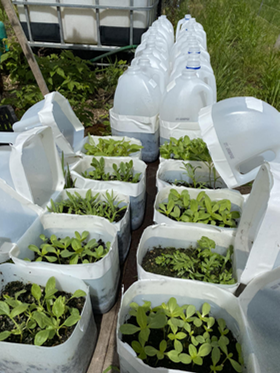Growing Native Wildflowers from Seed in Kentucky
Adapted from The Lady Slipper Newsletter
Growing native wildflowers from seed is an inexpensive and rewarding endeavor, especially if you enjoy a hands-on approach. In Kentucky, most native wildflowers require some form of preparation, such as stratification or scarification, to ensure successful germination. This article focuses on stratification, the most common method needed for Kentucky natives.
Understanding Stratification
Stratification is the process of breaking down a seed’s outer protection to promote germination. In nature, this occurs when seeds fall to the ground and overwinter in cold, moist soil. The fluctuating temperatures and moisture levels gradually wear down the seed coat, preparing it for germination in the spring. Many native wildflowers in Kentucky will naturally reseed themselves year after year without human intervention.
Manual Stratification Methods
For those who prefer more control over the germination process, collecting seeds and manually stratifying them can be effective. This can be done using various methods, including wet paper towels, sand, or vermiculite.
1. Using Paper Towels
Paper towels are a cost-effective option, though seeds can sometimes stick to the towel, making them difficult to remove. To use this method, layer seeds between two moist paper towels, ensuring there is ample space between them. Place the towels in a zip lock bag, seal it, and mark the bag with the date and species. Store the bag in the refrigerator, checking occasionally to ensure the towels remain moist. When ready to plant, you can lay the paper towel on your planting medium and cover it lightly.
2. Using Sand
Sand is less favored due to its tendency to dry out quickly and the difficulty of removing seeds for planting. If you choose this method, use fine sand, mix in the seeds, and place the mixture in a zip lock bag in the refrigerator. Regularly check to ensure the sand remains moist.
3. Using Vermiculite
Vermiculite retains moisture longer than sand and is easier to handle when transferring seeds to a planting medium. Mix seeds with moist vermiculite, place in a zip lock bag, and store in the refrigerator. This method may take up more space, but it simplifies the process of moving seeds to the planting medium.
Outdoor Stratification
If you prefer to let nature handle the stratification, you can prepare seed trays with your planting medium, spread the seeds, and place the trays outside in a protected area. This method mimics natural conditions but requires careful monitoring due to Kentucky’s unpredictable weather. Ensure the trays have drainage holes to prevent water from standing and causing seeds to rot. Mark your trays or create a map to identify what is germinating in the spring.
The Milk Jug Method
A popular method among growers is using milk jugs to create mini greenhouses. Cut a jug in half, fill the bottom with planting medium, and secure the top with waterproof tape. The jugs protect seeds from harsh winter conditions while allowing for ventilation and watering as temperatures warm. This method can lead to earlier germination, so be prepared to protect seedlings from late frosts.
Experiment and Learn
For beginners, experimenting with different methods can be educational and rewarding. Some species may germinate more easily than others, and you may find one method works better for you. Purchased seed packets often include stratification period information, but additional resources like “Growing and Propagating Wildflowers of the United States and Canada” by William Cullina can be invaluable.
Conclusion
Growing native wildflowers from seed in Kentucky involves understanding and applying stratification techniques. Whether you choose manual methods or let nature take its course, the process can be both satisfying and cost-effective. With patience and experimentation, you’ll soon enjoy the beauty of native wildflowers in your garden.

Winter Sowing-Bullitt County Extension

